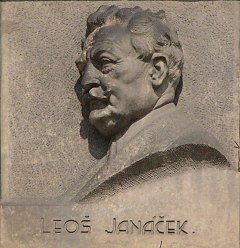The Excursions of Mr. Brouček
| The Excursions of Mr. Brouček | |
|---|---|
| Opera by Leoš Janáček | |

Relief of the composer by Julius Pelikán
|
|
| Description | satirical opera |
| Native title | Výlety páně Broučkovy |
| Other title | The Excursions of Mr. Brouček to the Moon and to the 15th Century |
| Librettist | many |
| Language | Czech |
| Based on | two novels by Svatopluk Čech |
| Premiere | 23 April 1920 National Theatre, Prague |
The Excursions of Mr. Brouček to the Moon and to the 15th Century (Czech: Výlety páně Broučkovy) is the complete title of Leoš Janáček’s fifth opera, based on two Svatopluk Čech novels, Pravý výlet pana Broučka do Měsíce (1888) (The True Excursion of Mr. Brouček to the Moon) and Nový epochální výlet pana Broučka, tentokráte do XV. století (1889) ('‘The Epoch-making Excursion of Mr. Brouček, this time to the 15th Century'’). The librettists for Part 1 were František Gellner, Viktor Dyk, František Sarafínský Procházka and others, while Part 2 was written by F. S. Procházka.
This two-part satirical opera was premiered at the National Theatre in Prague on April 23, 1920, the only Janáček opera not premiered in Brno.
Mr. Brouček (translated as “Mr. Beetle” (literally little beetle)) is a Philistine landlord in Prague who experiences a series of fantastic events as he is swept away (due in large part to excessive drinking) first to the moon and then to 15th-century Prague, during the Hussite uprising against the Holy Roman Empire in 1420 (see Synopsis). In both excursions, Brouček encounters characters who are transformed versions of his earthly acquaintances.
Due to the popularity of the original novels by the iconic Czech writer, Svatopluk Čech, the opera was met with much scrutiny. Janáček experienced a number of setbacks in the creation and rehearsal of the work, especially in dealing with librettists (See Background). The composer’s aim in The Excursions of Mr. Brouček was apparently quite specific: “I want us to be disgusted with such people, to stamp on them and strangle them when we meet them,” speaking of Brouček. Janáček’s campaign, along with Čech’s, was against the pettiness of the bourgeoisie, specifically of Czechoslovakia. However, according to Desmond Shawe-Taylor, who saw the opera performed in Czechoslovakia, most observers reacted with cheerful laughter and even felt a bit sorry for the poor fellow Brouček. He became almost lovable rather than despised, as Janáček had originally intended, and his shortcomings, failings, and ordinariness tend to be seen as qualities common to regular citizens of all lands.
...
Wikipedia
